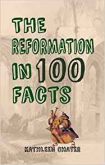The Reformation in 100 Facts by Kathleen Chater
| The Reformation in 100 Facts by Kathleen Chater | |
|
| |
| Category: History | |
| Reviewer: John Van der Kiste | |
| Summary: The Reformation has decisively shaped the modern world, and provided material for many a detailed account in print. This book reduces a very complex subject to a series of short sections which make an ideal introduction and serves its purpose perfectly as a pocket-size beginners’ guide. | |
| Buy? Yes | Borrow? Yes |
| Pages: 192 | Date: May 2016 |
| Publisher: Amberley Publishing | |
| ISBN: 978-1445651347 | |
|
| |
The Reformation was one of the major events, if not themes of European history, that has decisively shaped the modern world, and has inevitably provided material for many a detailed account in print. This handy little volume, one of a new series from Amberley, reduces a very complex subject to a series of short chapters which make an ideal introduction.
Dr Chater admits in her brief introduction that it is impossible to try and encapsulate the continuing effects of its development in only 100 facts. She says that she has concentrated mainly on British personalities and events in the British Isles, although naturally there is a certain amount of overlap with contemporary movements throughout Europe, where the new schools of thought originated. The result is a book which inevitably just touches the surface, as the title makes self-evident, but which acts as a good springboard for further research and study.
The facts – we can hardly call them chapters – are basically short articles, each between one and two pages in length. The first, ‘Politics trumps religion’, outlines the uneasy co-existence of both, in the various wars triggered by differing faiths which meant that between 1560 and 1715 there were only thirty years of peace across Europe. Others in the early pages of this book outline how Martin Luther was the first to challenge the Roman Catholic Church directly; how Jan Hus, a 14th-century heretic, has inspired resistance for 600 years; and how the Reformation would have failed without Gutenberg, the inventor of the printing press, which helped to disseminate ideas far more widely, quickly and effectively than if everyone had to rely on documents copied by hand instead. Later on, short biographical sections on Archbishop Cranmer, the English monarchs and Queen Elizabeth’s renowned spymaster Francis Walsingham, who might be regarded as the forefather of MI5, sit side by side with short accounts of how the Great Fire of London fuelled paranoia against foreigners, how two failed vicars created the biggest anti-Catholic scare in English history, how Huguenots created the Irish linen industry, and even how the creation of Belgium in 1831 had its roots in the Reformation.
As for the dissolution of the monasteries, we probably think of this as largely an English affair under Henry VIII, but it is noted that this had its parallels throughout the continent. The Kings of Denmark and Sweden began a process of confiscating establishments for their own enrichment or passing to the noblemen who supported them in the 1520s. It was generally a fairly bloodless process with priests, monks and nuns allowed to stay in their own churches, monasteries and convents until they died. Yet suppressions for political reasons continued into the nineteenth century.
I will admit to having approached this with only a very sketchy idea of the Reformation. As the foregoing suggests, its effects continued well beyond the sixteenth century, the age generally associated with it. Five centuries later the consequences continue to flow from the new ways of thinking it created. Protestantism even created Capitalism, and it was as recently as 1905 that Max Weber coined the phrase ‘Protestant work ethic’. In effect, perhaps the Reformation is not over yet.
This is a lively read, but cannot conceal the scholarship and breadth of knowledge from which it benefits. For a more weighty examination of the Reformation the reader will naturally turn elsewhere, but this serves its purpose perfectly as a pocket-size beginners’ guide.
For an interesting tale of political at the height if Reformation England, The Sorcerer's Tale: Faith and Fraud in Tudor England by Alec Ryrie, while Saints, Sacrilege and Sedition by Eamon Duffy provides a more academic selection of essays on the subject.
Please share on: ![]() Facebook,
Facebook, ![]() Twitter and
Twitter and
![]() Instagram
Instagram
![]() You can read more book reviews or buy The Reformation in 100 Facts by Kathleen Chater at Amazon.co.uk Amazon currently charges £2.99 for standard delivery for orders under £20, over which delivery is free.
You can read more book reviews or buy The Reformation in 100 Facts by Kathleen Chater at Amazon.co.uk Amazon currently charges £2.99 for standard delivery for orders under £20, over which delivery is free.
![]() You can read more book reviews or buy The Reformation in 100 Facts by Kathleen Chater at Amazon.com.
You can read more book reviews or buy The Reformation in 100 Facts by Kathleen Chater at Amazon.com.
Comments
Like to comment on this review?
Just send us an email and we'll put the best up on the site.


